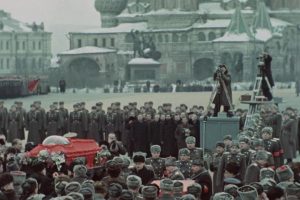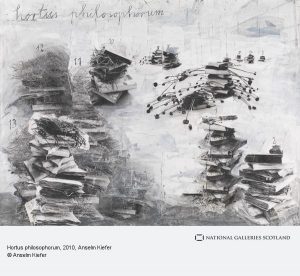 N. N. Trakakis teaches Philosophy at Australian Catholic University and writes and translates poetry. We invited him to answer the question “Is there a future for the philosophy of religion?” as part of our “Philosophers of Religion on Philosophy of Religion” series.
N. N. Trakakis teaches Philosophy at Australian Catholic University and writes and translates poetry. We invited him to answer the question “Is there a future for the philosophy of religion?” as part of our “Philosophers of Religion on Philosophy of Religion” series.
In his film, State Funeral (2019), director Sergei Loznitsa has assembled fascinating, and until now unseen, archival footage of the funeral staged for Joseph Stalin after the dictator’s death on March 5, 1953. We see Stalin lying in state in Moscow’s House of Trade Unions (the very site of the 1930s show trials), before being transported to the mausoleum in Red Square to lie beside Lenin’s embalmed corpse. One of the extraordinary features of the film is its beautifully stark and solemn, but perhaps also unintentionally subversive, portraits of the multitudes of ordinary people, officers and dignitaries that had descended upon the capital in the freezing cold to pay their last respects to the Great Leader, some in hysterics and tears (of sorrow? or secret satisfaction?), but most with blank faces, unwilling to show their hand, as they had learned so well to do.
Loznitsa provides no contextualising commentary (except for the closing credits where Stalin’s crimes are adumbrated). Instead, the viewer is compelled to make sense of what is happening, not as a detached observer but as a Muscovite immersed in the mourning throng. The director’s gambit is that one will emerge, not nostalgically glorying in the past (as the footage originally intended), but stupefied and despondent (which is how many critics have reportedly felt). This sense of disillusion and disorientation arises from the dark truths that the images reveal, subtly aided by the director’s editorial hand.
One of these truths is “they could be us”, as The New York Times film critic, A.O. Scott, expressed it. Stalin’s subjects are not unique: the ways in which they were ‘persuaded’ to conform to the dictates of the powerful replicates a common strand in the annals of history, and one that remains very much with us, albeit in less egregious or at least less obvious modalities. In a Q & A with Italian film director Pietro Marcello (which can be viewed here), Loznitsa insisted on the contemporary relevance of his film:
This film is not about the past. It is a film about how seductive this form of power is in general, including for the masses, who are magnetised by this form and are at the same time sacrificial animals of it… The thought I wanted to express in this film is very simple. Stalin is symbolic of all those people who have a little Stalin in them, who share this outlook and who compose, like little bricks, this whole apparatus of totalitarian destruction. Every time I turn to that in my mind and see these pictures, which magnetise me too, I’m struck by the paradox that unfolds before my eyes. Understanding the nightmare, people – just like mice – follow the piper to their doom. This is the kind of strangeness that is inherent in this place, in these people, in this culture. People carry it around inside them, and I would say that they don’t even notice it.
One of philosophy’s benefits – say those seeking to defend it from its many detractors today – is that it helps citizens develop the critical habits of mind that would prevent the very kind of dangerous and mindless conformity depicted in Loznitsa’s film. One would think that this should be the effect of any worthwhile education, whether or not it included a course in philosophy. I doubt, however, that education is living up to this ideal, as opposed to continuing along its traditionally conservative path: rigid and pedestrian, lacking in critical, imaginative and adventurous spirit, with undue emphasis on prestige, competition and outcomes such as grades, awards and ‘job-readiness’. Perhaps universities, and the professional philosophers therein, are an exception, valiantly acting as a counterbalance to these trends? Again, I doubt it. Theodore Roszak’s incisive anthology, The Dissenting Academy, and particularly his own brilliant introduction, “On Academic Delinquency,” remains as relevant as it was when published in 1967. Consider only the way in which Roszak opens his introductory essay, contrasting the Enlightenment philosophes with the contemporary professoriate:
There was a time when men of intellect described the purpose of their lives in ways that stirred the souls of the noble and chilled the blood of the base… “Dare to know!” So Kant defined the function of intellect in a day which pursued the critical examination of life and society neither as an amusing pastime nor as a lucrative career, but rather as an act of defiance and of risk… That was one age…and this is another. And what are the imperatives our students would find inscribed upon their teachers’ lives? “Secure the grant!” “Update the bibliography!” “Publish or perish!”1

 Philosophy of religion, like any other academic specialisation, has not been immune to these pressures, which have only intensified over recent decades due to the university sector’s almost wholesale capitulation to the neoliberal paradigm. But the especially bad shape in which philosophy of religion currently finds itself has not gone unnoticed, and commendable attempts are now being made to push the discipline in novel and more fruitful directions. But I’m not sure that many of these new paths are radical enough. Consider, for example, one symptom of the field’s ‘decadence’, so to speak: the preoccupation with positions, with defending or debunking a given conclusion, theory, or doctrine. In the recent past the preoccupation was with the credentials of theism (usually ‘bare theism’ or ‘classical theism’): its internal coherence, and the arguments for and against. Now, in an attempt to diversify and ‘globalise’ the field, the parameters have been widened to include alternatives such as process theism, pantheism, and naturalist theism, as well as Eastern religions and indigenous cultures that might involve a commitment to panpsychism, polytheism, or monistic idealism. But insofar as these models of divinity are indebted to, or embedded in, particular religious traditions, one might ask why (qua philosophers of religion) we should begin our explorations from a religious standpoint. Too often philosophy of religion functions as a façade for theology, for ‘faith seeking understanding’. In thinking philosophically about the existence and nature of ultimate (divine) reality, why prioritise (e.g.) the Bible or Aquinas, when there is a host of equally interesting but untapped sources outside of traditional religious frameworks (e.g., the poems of Keats, the plays of Beckett, the novels of Dostoevsky, the paintings and sculptures of Kiefer)? Or why not simply engage in untrammelled philosophical speculation? After all, it is philosophy we are engaged in, not prayer.
Philosophy of religion, like any other academic specialisation, has not been immune to these pressures, which have only intensified over recent decades due to the university sector’s almost wholesale capitulation to the neoliberal paradigm. But the especially bad shape in which philosophy of religion currently finds itself has not gone unnoticed, and commendable attempts are now being made to push the discipline in novel and more fruitful directions. But I’m not sure that many of these new paths are radical enough. Consider, for example, one symptom of the field’s ‘decadence’, so to speak: the preoccupation with positions, with defending or debunking a given conclusion, theory, or doctrine. In the recent past the preoccupation was with the credentials of theism (usually ‘bare theism’ or ‘classical theism’): its internal coherence, and the arguments for and against. Now, in an attempt to diversify and ‘globalise’ the field, the parameters have been widened to include alternatives such as process theism, pantheism, and naturalist theism, as well as Eastern religions and indigenous cultures that might involve a commitment to panpsychism, polytheism, or monistic idealism. But insofar as these models of divinity are indebted to, or embedded in, particular religious traditions, one might ask why (qua philosophers of religion) we should begin our explorations from a religious standpoint. Too often philosophy of religion functions as a façade for theology, for ‘faith seeking understanding’. In thinking philosophically about the existence and nature of ultimate (divine) reality, why prioritise (e.g.) the Bible or Aquinas, when there is a host of equally interesting but untapped sources outside of traditional religious frameworks (e.g., the poems of Keats, the plays of Beckett, the novels of Dostoevsky, the paintings and sculptures of Kiefer)? Or why not simply engage in untrammelled philosophical speculation? After all, it is philosophy we are engaged in, not prayer.
A sign that one is philosophising rather than worshipping (or beholden to an inviolable ideology like communism) consists in one’s preparedness to relinquish even one’s most cherished convictions, and to do so on a regular basis. That such fundamental changes or reversals in belief are rare in contemporary philosophy of religion highlights the depth of the discipline’s ‘dogmatic slumber’. The tonic might well be the questions we dare to ask. Specifically, we may need to re-envision the discipline in non-willful and non-teleological terms, as a journey with no predetermined end or even no end at all, but one where we are given permission, finally, to freely roam on roads less travelled, imaginatively constructing and experimenting but always ready to go, like Socrates, “wherever the wind of the argument carries us” (Republic 394d) rather than complacently relying upon (say) the authority of a sacred text or institution.
This is a philosophy of doubt and danger. Faith and conviction are eschewed in favour of humility (for as Caputo says, “we must all ‘fess up’ that we do not know who we are or what is going on, not ‘Really’, not in some ‘Deep Way’, although we all have our views”2 and what Keats called ‘negative capability’: the refusal of antidotes that purport to quash the questions (leaps of faith, metaphysical systems, etc.), persevering instead with the difficulties and uncertainties. But this is dangerous territory: with no assurances as to what lies ahead, and no guarantees of resolution or redemption, one’s vulnerability and insecurity are exacerbated – but so are the freedom and delight in undertaking such an adventure in ideas. Passion and risk are integral to philosophy, and philosophy of religion above all, which would be incomprehensible without suffering, even despair and desperation. As E.M. Cioran asked, “Haven’t people learned yet that the time of superficial intellectual games is over, that agony is infinitely more important than syllogism, that a cry of despair is more revealing than the most subtle thought, and that tears always have deeper roots than smiles?”3
Is there a future, then, for the philosophy of religion? Before resurrection there is death. A body lies in state, but it is not Stalin’s. And what, if anything, is reborn will depend on how we perceive and react to death.
Perhaps Cioran, a frequenter of cemeteries, gave the best response: “What they ask you for is actions, proofs, works, and all you can produce are transformed tears.”4
1. Theodore Roszak, “On Academic Delinquency,” in The Dissenting Academy, ed. Theodore Roszak (New York: Pantheon Books, 1967), pp.3-4.
2. Caputo, On Religion, 2nd ed. (Abingdon, Oxon: Routledge, 2019), p.189.
3. E.M. Cioran, On the Heights of Despair, trans. Illinca Zarifopol-Johnston (Chicago: The University of Chicago Press, 1992), p.22.
4. E.M. Cioran, The New Gods, trans. Richard Howard (Chicago: The University of Chicago Press, 2013), p.88.

I would say philosophy of religion is needed more than ever. But one which see to the future, not the past. We have to re state the problems of humanity and prove that an institutionalized religion and a techonological society need to contiunually test themselves regarding the validity if their thesis.